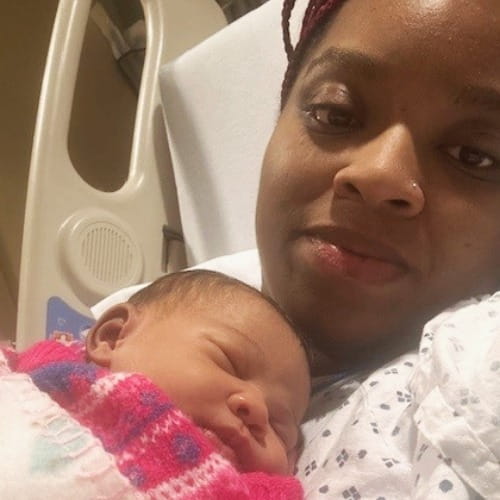Heart failure after childbirth: How Kirsten survived peripartum cardiomyopathy

Kirsten, 31, a busy mother and licensed professional therapist, enjoyed cooking and spending time with her large, extended family. She and her husband were recently married and thrilled to be expecting their first child together. Her pregnancy had been fairly routine; however, in her third trimester, she began having concerning dreams.
"One dream took place after I had given birth," Kirsten recalls. "I was discharged and going home, but I still had all of these wires connected to me — connected to my arms, my heart, everywhere. A doctor came to my apartment and said, 'You're still too sick, you need to come back.'"
Upon waking, Kirsten chalked the dream up to anxiety, but she would soon realize it was a foreshadowing of the health challenges that lie ahead.
Early warning signs of heart trouble during pregnancy
At 37 weeks pregnant, Kirsten began experiencing swelling in her legs and feet, difficulty breathing and low energy. She also had trouble getting up and down the steps to her third floor apartment. "I wasn't thinking it had anything to do with my heart; I was just thinking it was late stage pregnancy symptoms, but maybe a little bit more severe," says Kirsten.
At her next prenatal care visit, Kirsten's obstetric nurse practitioner was concerned about her swelling and suggested she visit the emergency room at Bryn Mawr Hospital, part of Main Line Health. There Kirsten was examined by an obstetrician, and all of her tests came back normal. She was discharged but instructed to closely monitor her blood pressure and symptoms for any changes.
The family support that helped save her life
Following the advice of her obstetrician, that evening Kirsten took her blood pressure and it was high. Remembering that her cousin, Angelique, had experienced heart failure after she delivered her twins, she decided to call her for support.
"Angelique is the reason I'm still here. She told me to go back in and ask for an echocardiogram and have them look at my heart," says Kirsten.
Kirsten went to the emergency room, where an echocardiogram revealed that her ejection fraction was low, meaning her heart wasn't pumping effectively and she required medication. Since her baby was full term, Kirsten's obstetrician suggested they schedule a C-section for the next morning before starting any new medications.
Kirsten welcomed a healthy baby daughter, Scarlett. Her care team started medications to improve the pumping function of her heart, scheduled a follow-up cardiology appointment and discharged her home. Kirsten felt good and was looking forward to beginning life as a family of five.

A critical diagnosis: Peripartum cardiomyopathy
When Scarlett was one week old, Kirsten again experienced swelling and difficulty breathing, but this time her symptoms were much worse than ever before. "When it really hit me, I was in bed trying to fall asleep, and I could hear this gurgling sound when I was taking a deep breath. It felt like I was drowning," says Kirsten.
"I was thinking about the dream I had where they told me I was too sick and needed to go back to the hospital, and all of that was culminating," Kirsten recalls.
Kirsten's heart trouble had evolved into an uncommon type of heart failure called peripartum cardiomyopathy. This condition can occur toward the end of pregnancy or in the months following delivery. The heart chambers enlarge and the heart muscle weakens, leading to decreased pumping ability and causing fatigue, shortness of breath, rapid heart rate and swelling.
Recognizing symptoms of peripartum cardiomyopathy
"Sometimes symptoms of peripartum cardiomyopathy can be mistaken for normal pregnancy or postpartum symptoms, which makes early detection challenging," says Kaitlyn Ibrahim, MD, cardiologist at Main Line Health. Furthermore, symptoms can develop gradually, and some women may not even experience symptoms until the condition is advanced.
Peripartum cardiomyopathy occurs within the last month of pregnancy or within five months postpartum and is diagnosed based on an echocardiogram, or ultrasound of the heart, showing decreased pumping function of the heart. Doctors rule out other potential causes of cardiomyopathy, or heart failure, before coming to this diagnosis.
Women should monitor their health during pregnancy and postpartum for the following symptoms, which may lead to further testing:
- Shortness of breath with light activity and when lying flat
- Fatigue
- Fluid retention that causes leg swelling, cough, and/or congestion
- Chest pain or tightness
- Heart palpitations, lightheadedness or almost fainting
"Persistent or worsening symptoms, particularly after delivery, warrant further evaluation," cautions Dr. Ibrahim. "Closely monitoring your symptoms and communicating with your doctors, as Kirsten did, could help save your life."
Treatment for heart failure while bonding with a newborn
Kirsten was admitted to the cardiac inpatient unit at Bryn Mawr Hospital. "She was given IV diuretics to decrease fluid retention, and she was started on medications to strengthen the pumping function of her heart," explains Dr. Ibrahim. "She wanted to breastfeed, and we were able to choose cardiac medications that were safe for Scarlett."
Over the course of five days, Kirsten released 25 pounds of fluid, which reduced her heart's workload and improved her symptoms.
Since Scarlett was only one week old and Kirsten was exclusively breastfeeding, the nurses made arrangements for Kirsten's family to stay together. They brought a bassinet and reclining chair into the room. Kirsten was able to continue to bond with her newborn, and if she needed to be away for tests or treatment, her husband could care for Scarlett.
"I'm just so appreciative for Dr. Ibrahim and the entire cardiology team that helped me," says Kirsten. "The biggest hope I have is that people learn from my experience the importance of listening to your body and having a strong will to not let anything be the end of your story."
Thriving after peripartum heart failure
It has been two years since Kirsten's heart failure experience, and thanks to careful monitoring by Dr. Ibrahim, her heart function is back to normal. She has made diet and lifestyle modifications and takes medications to keep her in the best shape possible to work and care for her family, including Scarlett — now an active toddler.
"She is wonderful," says Kirsten, proudly. "She is quite the wild child, but also a sweetheart. She is the best parts of me and her father. I went through all of this for her, and I constantly remind myself of that."
Next steps
Schedule an appointment with Kaitlyn Ibrahim, MD
Learn more about the Cardio-Obstetrics Program at Main Line Health
Learn more about heart and vascular care at Main Line Health
 Content you want, delivered to your inbox
Content you want, delivered to your inbox
Want to get the latest health and wellness articles delivered right to your inbox?
Subscribe to the Well Ahead Newsletter.
